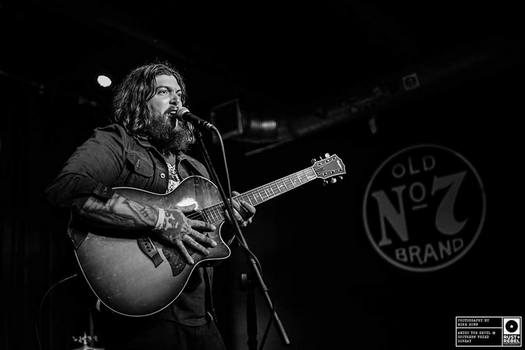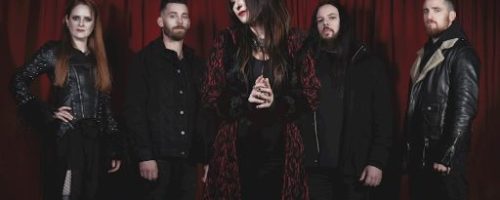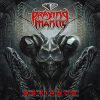Amigo the Devil – Bringing Darkness to Folk
Monday, 22nd October 2018
Certainly not the most traditional of moves in the inspiration and creation of Amigo the Devil, but one that sits in-line with his uniquely-styled music. Originally involved in the hardcore and metal scene, Danny Kiranos decided to pick up the banjo one day and went with it. What came next has been described as ‘murder folk’ by some – a dark and almost gothic vibe to acoustic storytelling that captures an intimate and personal touch. In short, despite its acoustic flavor, there’s a lot of content that extreme fans will enjoy quite a bit.
Amigo the Devil has conjured up a number of EPs in recent years, but the recently released Everything is Fine is his first full-length effort, in which he also collaborated with producer Ross Robinson and Rage Against the Machine’s Brad Wilk on drums. Some high-stakes to be sure, but the end result is a satisfying mix of grim stories that ultimately deal out some redemption. Kiranos chatted with us one afternoon prior to release to discuss how Amigo began, all things Everything is Fine, and his former employment in the brewing industry.
Dead Rhetoric: You initially dabbled in some metal and hardcore before picking up the banjo. What did you like about the transition to an acoustic instrument?
Danny Kiranos: It definitely wasn’t the plan – I had some acoustic instruments laying around because I enjoyed collecting instruments that made sounds, more than anything. I had a banjo for years before I even touched it. It was cheap enough to buy and it was kind of funny. I didn’t grow with any of that music around me: country, folk, Americana. It was all heavy or electronic-based music. I feel like the transition came more naturally than if I did plan it, because it came out of boredom. It was a situation where I picked it up because I was bored, and I started realizing on my own terms that it was more versatile than I had expected it to be.
Dead Rhetoric: Do you feel there’s a certain level of intimacy with a more minimal/acoustic approach?
Kiranos: I think the reason that I ended up sticking with the acoustic instruments is because most of what I wanted to do was based on the storytelling aspect of it. The acoustic instrument seemed like a solid platform to tell stories over, as opposed to filling space and trying to cut the lyrics to more layered and textured instrumentation.
Dead Rhetoric: What can you say about your approach to storytelling? What do you look at in terms of writing lyrics in order to tell a story?
Kiranos: It’s so much more elaborate in my head than it ends up being. I’ll start in a casual way, creating this idea for whatever person/place that I am putting my place into. Then I’ll create these scenarios and then I go off the deep end with it. I never end up with the ability to write it all into a song because it’s way too damn much [laughs]. The songs usually end up being about one emotion that I got stuck on within that story, as opposed to the story itself. So I guess I’m not doing that well at telling stories [laughs], because I get stuck on one aspect. That’s how it has been working out. This has been a big learning curve or me, and I’m definitely not ashamed to admit that a lot of what happens is unplanned and a lucky shot.
Dead Rhetoric: To that regard, you can really only tell so much within a 3-5 minute window anyway.
Kiranos: Time to start writing these epic 15-minute ballads [laughs]!
Dead Rhetoric: You could always shoot for a concept album.
Kiranos: I really wanted to do one for this record, and it wasn’t ready. It’s there. It exists, and hopefully it will be born one day.
Dead Rhetoric: With releasing a string of EPs in the past, did you approach Everything is Fine any differently?
Kiranos: I was really scared about it, because I was so used to the EPs. One of the big differences between writing the EPs and doing this, was that doing 3-5 songs I could really focus on making those songs exactly what I wanted them to be. My attention span wanders every few minutes I’d say [laughs], so with the longer release, I kept second-guessing myself: “Does this part fit better over here? Does this song sound too similar to this other song?” It was a much more doubtful process – I was sitting there with so many songs, trying to figure out which ones were going to come together as one complete package.
Ultimately, even with all of those fears, at the end it was the opposite problem that I had to figure out. Which songs do we not record? I was finally happy with a lot more songs than I expected to be, so we had to drop some. It was a cool process and it definitely put me into a different mindset where I had to relate songs to each other and figure out if they were going to work or not. In the end, I did want to keep a variety to it. I feel lucky enough that we were able to do that, since we haven’t been stuck in any genre per say, so I wanted to take advantage of that while I can and put a little of everything on there.
Dead Rhetoric: That is funny, because I’ve seen so many little ‘micro-genres’ thrown at you, like “Murder Folk.”
Kiranos: [Laughs] Southern gothic is another one that gets thrown around a lot. It’s funny. You can’t expect the genre game to stay as a major component with so much content out there. Everyone has so much access to recording and releasing at this point. It’s a cool thing. I think everyone is just going a little nuts, and that overboard aspect is kind of cool. It’s going to lead to some really insane releases.
Dead Rhetoric: I think it’s cool too that in listening to your music, you can hear some of these branches moving away [to different subgenres] and it brings an added wealth to the material.
Kiranos: It’s something I’m always striving for to be honest. I don’t know if it comes across that way or not, but it’s a goal, so that’s nice to hear. One of the first shows I played was with a band called Rotting Out. It sort of set the stage for that comfort level to branch out. Everyone that came to that tour was so welcoming and so kind. It really helped me feel comfortable reaching out to places that I don’t really belong or shouldn’t be in. I’m very grateful to them. It was a really cool – it was Nomads, Sleepwalkers, and Rotting Out. My buddy Mike, who plays in Nomads, got us on to that tour. He kind of kickstarted the whole thing.
Dead Rhetoric: You’ve toured with a lot of heavier bands in the past. What sort of reactions would you get?
Kiranos: I think that for the majority of the time, it [the music] was so opposite of what else was happening that people were at least curious. When they see a fat kid with a banjo, they are like, “What the hell is going on?” They sit there, and they at least give it a shot. I’m not saying it works every time, but we haven’t really had any disrespectful situations where someone was blatantly been rude. Everyone has been at least kind enough to give it a shot. There’s nothing that is for everyone. I’m just grateful for the chance for them to be able to listen. Beyond that, it’s out of my hands. For the most part, it’s been very welcoming and a very kind reception.
Dead Rhetoric: Could you discuss Ross Robinson and Brad Wilk’s role in the end product of Everything is Fine.
Kiranos: Ross and I clicked very well, which made me happy because I had heard all of the stories about how intense things could get. They did get intense to a different degree I think. We fed off each other a lot. I came in with most ideas of the songs written, and his approach was more, “Okay, how can we take these ideas that you have and not necessarily shuffle them around in terms of parts” the structure remained the same, but the structure was the least important part. His approach was more about how we could grab the songs from the bottom and pull them down as far as we could go, and let them slingshot back up into whatever comes out on the recording. Instead of making sense of the puzzle in terms of how the pieces fit, we’d analyze why something fits there. Why was something the way that it was in a particular part? That was more important than what makes sense sonically, or what is the most pleasant part. It was what makes the most sense to accent the reason that it is there.
It was a new approach that I hadn’t dealt with, and it was amazing. All of a sudden you realize just how insignificant some things are. There were parts that I loved, little clicks and clacks that I just loved, but after talking about it, I realized that it was excessive and unnecessary – it was too much. I was finally happy to drop those parts, and it made sense in the end. Brad was so damn kind to be on this. It was amazing. Watching him play, in close distance, than hearing him play on records or seeing him play at shows, because I got to feel his pulse while we were playing, essentially. I think the biggest role, other than the obvious bad ass drums and percussion, was that he had such a great feel for the pulse of the song. It really helped set that meter to where it was the most effective or carry the best. I don’t think it would have been the same without him.
Dead Rhetoric: Could you also discuss the idea of Everything is Fine as the album title.
Kiranos: I feel like it’s one of those things, where you hear someone say that, especially if it is a close friend or family member, it’s very obvious that it is always the opposite. It’s the ‘shut up and don’t talk to me. Everything’s fine. Leave me alone.’ At the same time, this was the first record that I kind of went into my own personal experiences with. Most other songs came from imagining certain perspectives or things like that.
This was the first record that I definitely went through my own experiences for, and there’s a shifting of tides through the course of the record from doubt to redemption and coming to terms with it, and at the end, there’s a resolution where everything is going to be okay. I know it’s a very basic record, but at the time it was very important to me. I know a lot of people are struggling with a lot of stuff right now, and the most important sentiment to put out there, for me, was that a lot of people are feeling that way, so you aren’t crazy for feeling like that. You aren’t wrong for feeling that way.
Dead Rhetoric: Where does the inspiration for darker and more morbid themes stem from?
Kiranos: I think that is part of the way that I process things. Especially when I was young, I would take the darkest and worst things that were going on and try to make light of them. I wasn’t good at taking things seriously, at all. Not in a good way – I didn’t have the ability to process things well and consider them as serious situations. I think the older I got, the more instinctual it was to try to understand the darker side and why it was there, and why it is the way it is. That mixed with my fascination for true crime and horror. If you take a problem, and you relate the problem to the absolute worst version of that problem, the problem at hand doesn’t seem too bad after all, but when you relate it to something as bad as…the serial killer thing is an easy reference. If you humanize it, you can humanize your problems, and then it’s something that’s more tangible. As soon as you humanize something, it becomes defeatable and gone at some point. I think that helps me, with dealing with something that is intangible. Any irritation, rage, jealousy – it’s a learning process.
Dead Rhetoric: I’ve seen the “I’d rot in hell with you” slogan a few times. Could you explain that one a little bit?
Kiranos: It’s a chorus to one of my songs. Initially I just wanted to write a love song from a different perspective. One that doesn’t relate to the fairy tale aspect – prince and princess type people. It’s just a regular “Hey, we’re just regular shitheads and we love each other. We do stuff that other people might not think is cool, but we think it is.” The less traditional side of that romance – “we might not be the best, but we are going to hell together. I’d happily suffer through the worst with you.” As long as I can be with you, I’ll suffer through the worst.
Dead Rhetoric: I saw you have a master’s in brewing.
Kiranos: Yeah, that was the industry I was in before taking music seriously. I started school in Chicago, then I went to Munich, Germany to finish the program. I worked at a couple breweries, and I was in the process of opening one. Things fell through, and at the same time, I was starting to realize that I enjoyed doing the music a little bit more. It was a pretty easy decision to be honest. I love brewing and beer, but at that time, the industry was taking a turn that I didn’t really care for in terms of attitude and all that. I figured I’d try the music thing, and if it didn’t work, I’d get a job at a brewery again [laughs]. That industry isn’t going anywhere soon, but I’m not going to be able to tour later on, at the starter stage, so I wanted to give it a shot while I was still kind of young.
Dead Rhetoric: Have you thought about combining things and doing a collaboration with a brewery?
Kiranos: Oh yeah, we have talked with a few breweries, and hopefully this year it will happen. There’s definitely talks going on, just nothing set in stone yet. The Pig Destroyer beer that was done was so good.
Dead Rhetoric: Is there a particular style of beer you think would fit the music?
Kiranos: I think, from my personal preference in beer as it’s what I have always gravitated to – sours. Belgian styled sours and lambics are my personal favorite. There’s some sort of intrigue that sets sour beers apart from other styles that it takes some time to acclimate to. I think maybe this project is similar. People, including myself, struggle to put it into one specific genre and there’s that whole thing. I think sours are pretty similar to that.
Dead Rhetoric: What plans do you have for the rest of 2018 and into next year, outside of your upcoming fall tour?
Kiranos: I know we are going to be focusing a lot on festivals, that’s the goal at least. I know we do have some touring in the works for January and February that will be announced soon. Besides that, the festival game is pretty fun. This is the first year I have done any bigger festivals. I used to do things like Southwest Terror Fest, and I loved doing those. This is the first year we could go beyond that and it’s fun. I didn’t realize how much fun they were. I’m hoping for the best on those.
Amigo the Devil official website






















